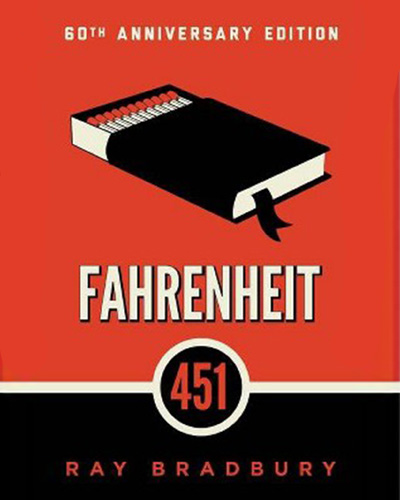
| Language | From $0.00 |
| Release Date | October 19, 1953 |
| Genre | Classics |
| Author | Ray Bradbury |
| File Size | Simon & Schuster |
| Rating | (4.05) |
A dystopian society in which books are illegal and firemen are tasked with burning them, Fahrenheit 451 presents a bleak vision of the future. Knowledge and free thought are suppressed in favor of mindless entertainment and conformity.
The novel takes place in an unspecified future where the government exercises complete control over its citizens by regulating the information they consume. People are discouraged from thinking critically and are instead encouraged to indulge in mindless entertainment.
In this world, firemen are tasked with burning books to prevent the spread of knowledge. Their role is to enforce the government’s control over the population and maintain the status quo.
Books are seen as dangerous tools that can inspire rebellion and individual thought. By burning books, the government aims to maintain a passive and ignorant society, easily manipulated and controlled.
The story revolves around the journey of the protagonist, Guy Montag, and his interactions with other characters, such as Clarisse McClellan and Captain Beatty.
Montag is a fireman who begins to question his role in society and the value of books. Through his interactions with Clarisse and other characters, he embarks on a journey of self-discovery.
Initially content with his job, Montag becomes increasingly disillusioned with his life and the oppressive society in which he lives. He begins to question the purpose of burning books and seeks to understand their value.
Clarisse is a young, free-spirited girl who challenges Montag’s beliefs and introduces him to the world of books and ideas. Her curiosity and unapologetic love for knowledge inspire Montag to question his own life and the society he inhabits.
Clarisse serves as the catalyst for Montag’s transformation, representing the antithesis of the society in which they live.
Clarisse is curious, imaginative, and unafraid to question the world around her. Her inquisitive nature sets her apart from others in the novel and ultimately leads to her disappearance.
By introducing Montag to books and ideas, Clarisse opens his eyes to the possibility of a different, more fulfilling life. Her influence on Montag is profound and sets him on a path to challenge the status quo.
Captain Beatty, the fire chief and Montag’s superior, serves as the primary antagonist in the novel. He is a complex character who both enforces the government’s oppressive policies and understands the value of books.
Beatty embodies the oppressive regime in the novel, using his knowledge of books and their contents to manipulate and control others. He serves as a constant threat to Montag’s newfound curiosity and pursuit of knowledge.
As Montag’s curiosity grows, his relationship with Beatty becomes increasingly strained. Beatty’s attempts to suppress Montag’s newfound love for books ultimately lead to a confrontation between the two characters.
Fahrenheit 451 explores the importance of books and knowledge, as well as the consequences of censorship on society.
Books are portrayed as powerful tools that can inspire change and foster individual growth.
In the novel, books represent the accumulation of human knowledge and experience. They offer insights and perspectives that can help people understand the world and themselves.
Books also serve as catalysts for personal growth, allowing individuals to learn from the experiences of others and develop their own unique perspectives.
Censorship in Fahrenheit 451 is a means of controlling society and suppressing individual thought.
By restricting access to books and knowledge, the government effectively stifles individual thought and creativity, creating a passive society where conformity is valued over innovation.
Censorship allows the government to maintain its control over the population, ensuring that citizens remain ignorant and unable to question or challenge the regime.
Despite the bleak setting, the novel offers hope for a future where knowledge is valued, and individuals are free to think and learn.
The “book people” are a group of individuals who have memorized entire books to preserve their contents for future generations. They represent the possibility of a brighter future, where knowledge can be reclaimed and shared.
Montag’s journey and the existence of the “book people” suggest that change is possible and that a society that values knowledge and individuality can be achieved.
Bradbury employs various literary techniques, such as symbolism and foreshadowing, to convey his message and enhance the novel’s impact.
Symbols are used throughout the novel to represent various ideas and themes.
Fire is a central symbol in the novel, representing both destruction and the potential for rebirth. While fire is used to burn books and suppress knowledge, it also symbolizes the possibility of a new beginning.
The Mechanical Hound, a robotic dog used to track and kill dissenters, serves as a symbol of the oppressive regime in the novel. Its relentless pursuit of Montag represents the government’s determination to maintain control over its citizens.
Bradbury employs foreshadowing and irony to create suspense and drive the narrative forward.
The title, Fahrenheit 451, refers to the temperature at which paper burns, foreshadowing the novel’s central theme of book burning and censorship.
Irony is used throughout the novel to highlight the absurdity of the society in which Montag lives. For example, the role of firemen as book burners is an ironic twist on their traditional role as protectors.
Fahrenheit 451 remains a relevant and powerful novel, offering a cautionary tale about the dangers of censorship and the importance of preserving knowledge.
In a time where access to information is easier than ever, the novel serves as a reminder of the importance of critical thinking and the dangers of allowing governments to control the flow of information.
Fahrenheit 451 continues to be celebrated as a dystopian classic, inspiring readers to value knowledge and question the status quo.
Works cited
Further reading